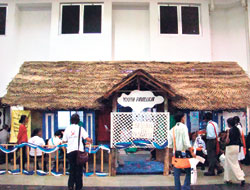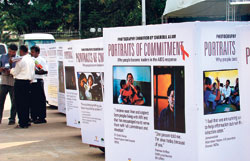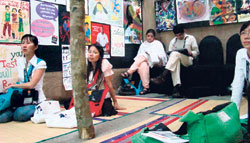Paving the way for their future
By Tharangani Perera
 During a time when youth constitutes the largest cohort ever to enter the transition to adulthood, and yet face costly challenges such as low quality education, high rates of unemployment, crime, early pregnancy and the highest rates of HIV/AIDS infections the world has yet seen, policy makers' demand to tap their enormous potential is urgent. But can the world create a future for youth without their input? During a time when youth constitutes the largest cohort ever to enter the transition to adulthood, and yet face costly challenges such as low quality education, high rates of unemployment, crime, early pregnancy and the highest rates of HIV/AIDS infections the world has yet seen, policy makers' demand to tap their enormous potential is urgent. But can the world create a future for youth without their input?
Taking youth participation beyond the rhetoric and slogans, the young delegates from around the Asia-Pacific region voiced their opinions at the 8th International Congress on AIDS in Asia and the Pacific (8th ICAAP) in Colombo. Brought together as one by the conference and making their voices heard to support the response to HIV, the delegates sought empowerment to combat this pandemic in their regions.
Recognising that young people are at the heart of the pandemic, the Youth Forum of the 8th ICAAP empowered the youth to effectively call for and carry out sustainable actions to prevent the spread of HIV among their generation. To this end, it was important that young people were given access to information, services, support and resources by adults, policy makers and other stakeholders in the movement.
The main activities initiated by the Youth Forum were The Asia Pacific Regional Youth Forum (APRYF) and The Youth Pavilion (YP).
APRYF equipped and enabled young people to navigate and participate in all Congress activities, while ensuring their voices were heard. It provided technical information and capacity building in political, scientific, economic and social contexts. Most importantly, it was a platform for youth to highlight youth specific issues to be lobbied at the main Congress.
 The YP was an interactive youth space that allowed young people to review the Congress and past declarations in keeping with their vision for the response to HIV in the future. Participants used this space to share their experience and efforts in their respective countries in dealing with HIV-related issues. Furthermore, youth speakers shared their thoughts and the past and present achievements of the youth from the Asia-Pacific region in combating the epidemic were displayed exhibition-style. The YP was an interactive youth space that allowed young people to review the Congress and past declarations in keeping with their vision for the response to HIV in the future. Participants used this space to share their experience and efforts in their respective countries in dealing with HIV-related issues. Furthermore, youth speakers shared their thoughts and the past and present achievements of the youth from the Asia-Pacific region in combating the epidemic were displayed exhibition-style.
David Bridger, the Country Coordinator for UNAIDS emphasised the importance of networking and lobbying in terms of raising young people's issues on the agenda. He expressed that young people could use modern technology to work as prevention activists.
The plenary session at the end of the day of Pre-Congress activities was most interesting as it provided a platform for youth to present their opinions and experiences to the main Congress. The discussion was based on the rights and responsibilities of the young AIDS activists under five subheadings: Listening, Money, Truth, Access and Sex.
Under the aspect of "Listening", the young delegates expressed their need to be heard by society, to have an opportunity to speak out in public, and to be accountable. They realised that realistic goals needed to be set and that young people needed to be recognised as responsible parties by governments and policy decision makers. Greater youth participation in prevention acts, which can be achieved by making youth programmes more interesting for young people, was realised to be a crucial element in the response to HIV.
 Alischa Ross, the facilitator for the plenary session said that most young people have the incentive to take action and yet are hindered by the lack of resources. The youth expressed that they needed to be given access to resources to ensure the decrease of infection probability through youth programmes. They also wished to be empowered and educated to use their own skills to find sustainable income to fund their projects. In addition, they stated the importance of being seen as an independent party by financiers. Alischa Ross, the facilitator for the plenary session said that most young people have the incentive to take action and yet are hindered by the lack of resources. The youth expressed that they needed to be given access to resources to ensure the decrease of infection probability through youth programmes. They also wished to be empowered and educated to use their own skills to find sustainable income to fund their projects. In addition, they stated the importance of being seen as an independent party by financiers.
In turn, the youth recognised that they have responsibilities to fulfill if their rights are granted by adults, stakeholders and policy decision makers. They recognised the presence of partnerships and interaction with adults to be a key ingredient in their movement against HIV. They sought for ways to ensure that there is proper understanding between the two parties and that the above mentioned rights are also applicable to adults.
David Epharem from Papua New Guinea emphasised the importance of youth's capability to fund their programmes in the movement. The young delegates realised their responsibility to approach realistic targets and willingness to develop means of gaining resources. They expressed their commitment towards initiated projects.
 "It is time for youth to take a stand on what should be taught under sex education in schools; it's your commitment to your education!" Sandeep from India said. He shared that in India, sex education is not always available to young people and that a proactive role in ensuring the accessibility of sex education would be a great step forward in the movement against HIV. "It is time for youth to take a stand on what should be taught under sex education in schools; it's your commitment to your education!" Sandeep from India said. He shared that in India, sex education is not always available to young people and that a proactive role in ensuring the accessibility of sex education would be a great step forward in the movement against HIV.
Availability of trustworthy information such as education material, which is consistent and based on scientific findings and access to comprehensive and open minded sex education in the schools in the Asia Pacific region were discussed as important elements under the aspect of "Truth."
The delegates expressed their willingness to build capacity to attain such comprehensive and trustworthy information and to find middle ground basis between young and adult communication.
Delegates who were discriminated against for various reasons, such as their efforts towards the HIV eradication movement stressed the importance of youth-friendly help and health care services and access to a safe environment within which anonymity is preserved and stigma is eradicated. These resources were also deemed as essential for safe testing, discussion-based information exchange and action against the spread of HIV.
"Sex is an important part in young people's development," said Alischa Ross, paving the way for the discussion to address the aspect of Sex. The delegates discussed problems that young women face, such as sexual violence, early marriage and participation in sex work. The delegates identified key drivers of these issues that need to be addressed in order to ensure the protection of these victims.
Reasons that young people take up sex work was identified to be six-fold: poverty led the list of drivers, followed by unemployment, pressure by parents and peers, being sold or forced into sex work, as an income to support addiction to drugs, loneliness and curiosity.
The youth forum considered lack of information regarding 'safe sex', STDs and HIV, illegality of sex work, lack of choice of 'safe sex' and access limitations to female condoms to be crucial factors that cause vulnerability in young sex workers to HIV.
To resolve these problems, the delegates conceived a plan that emphasized the need for accessibility of free or low-cost medicine and healthcare, vocational support skills training and eliminating stigma towards sex workers. Furthermore, education on dangers, illegality and consequences of sex work, discouragement of taking up sex work as a lucrative trade, creating diverse job opportunities were seen to be solutions in reducing the number of sex workers.
The future of the HIV plague lie in the hands of young people, and the lifestyle they adopt now and maintain throughout their sexual lives will determine the course of the pandemic for decades to come. The future is theirs… Let them be a part of it!
|
|

 During a time when youth constitutes the largest cohort ever to enter the transition to adulthood, and yet face costly challenges such as low quality education, high rates of unemployment, crime, early pregnancy and the highest rates of HIV/AIDS infections the world has yet seen, policy makers' demand to tap their enormous potential is urgent. But can the world create a future for youth without their input?
During a time when youth constitutes the largest cohort ever to enter the transition to adulthood, and yet face costly challenges such as low quality education, high rates of unemployment, crime, early pregnancy and the highest rates of HIV/AIDS infections the world has yet seen, policy makers' demand to tap their enormous potential is urgent. But can the world create a future for youth without their input? The YP was an interactive youth space that allowed young people to review the Congress and past declarations in keeping with their vision for the response to HIV in the future. Participants used this space to share their experience and efforts in their respective countries in dealing with HIV-related issues. Furthermore, youth speakers shared their thoughts and the past and present achievements of the youth from the Asia-Pacific region in combating the epidemic were displayed exhibition-style.
The YP was an interactive youth space that allowed young people to review the Congress and past declarations in keeping with their vision for the response to HIV in the future. Participants used this space to share their experience and efforts in their respective countries in dealing with HIV-related issues. Furthermore, youth speakers shared their thoughts and the past and present achievements of the youth from the Asia-Pacific region in combating the epidemic were displayed exhibition-style. Alischa Ross, the facilitator for the plenary session said that most young people have the incentive to take action and yet are hindered by the lack of resources. The youth expressed that they needed to be given access to resources to ensure the decrease of infection probability through youth programmes. They also wished to be empowered and educated to use their own skills to find sustainable income to fund their projects. In addition, they stated the importance of being seen as an independent party by financiers.
Alischa Ross, the facilitator for the plenary session said that most young people have the incentive to take action and yet are hindered by the lack of resources. The youth expressed that they needed to be given access to resources to ensure the decrease of infection probability through youth programmes. They also wished to be empowered and educated to use their own skills to find sustainable income to fund their projects. In addition, they stated the importance of being seen as an independent party by financiers. "It is time for youth to take a stand on what should be taught under sex education in schools; it's your commitment to your education!" Sandeep from India said. He shared that in India, sex education is not always available to young people and that a proactive role in ensuring the accessibility of sex education would be a great step forward in the movement against HIV.
"It is time for youth to take a stand on what should be taught under sex education in schools; it's your commitment to your education!" Sandeep from India said. He shared that in India, sex education is not always available to young people and that a proactive role in ensuring the accessibility of sex education would be a great step forward in the movement against HIV.